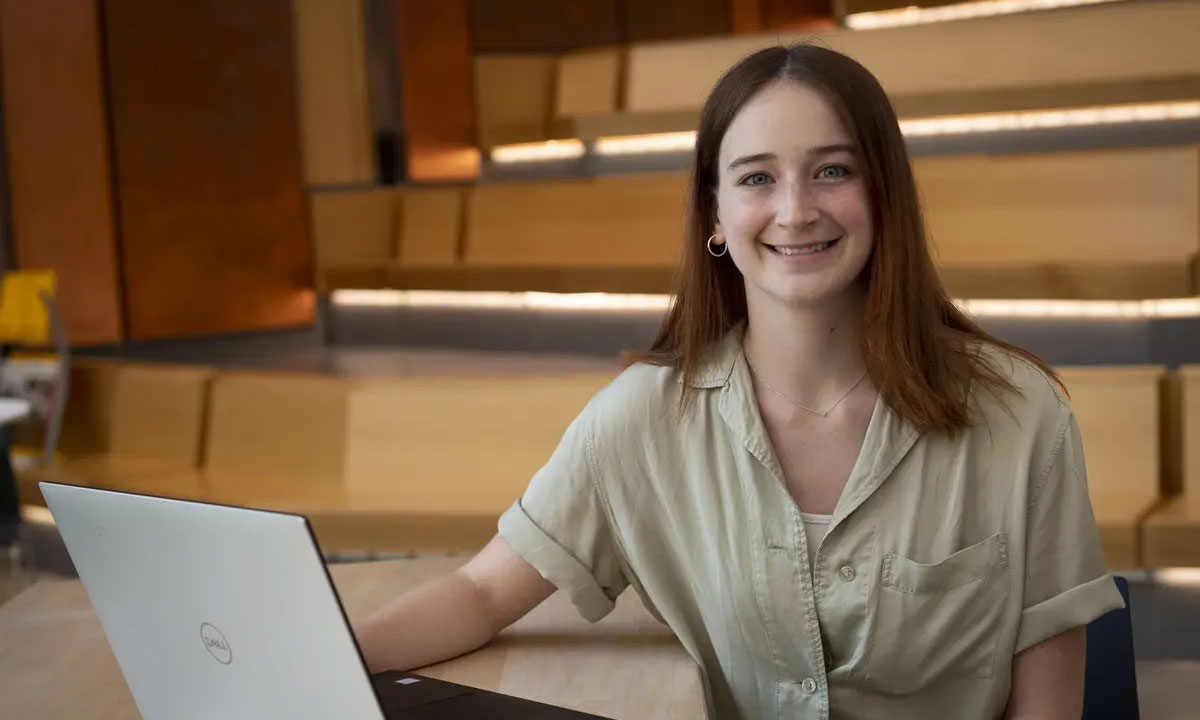Class of 2023: Sierra Tutwiler puts her energy into energy

First-generation college grad, a double major in physics and mechanical engineering, directs her passion for science and research into power.
By Leah Landry
Sierra Tutwiler always knew she wanted to attend college. But she also knew that getting there wasn’t going to be easy. Her mom worked 60 hours a week in retail just to keep them afloat.
“I was raised in a single-parent household with my mom, who suffers from multiple autoimmune diseases,” Tutwiler said. “From a young age I knew that there was no way we could set aside money to pay for college — and that if I wanted to go, it would be up to me to make it happen.”
After graduating as valedictorian from the Center for Engineering at Highland Springs High School in Henrico County, Tutwiler made her way to Virginia Commonwealth University on an academic scholarship. She graduates this semester with a double major in physics from the College of Humanities and Sciences and mechanical engineering from the College of Engineering, with a concentration in nuclear engineering and a minor in mathematics.
“When I was in fifth grade, my teacher handed out lists of the top 10 highest-paid careers, and No. 3 on the list was engineering,” Tutwiler said. “I thought to myself: I like math, I could do this, and this can get us a house.”
Her mom has a house of her own now, but Tutwiler’s dedication persisted as a first-generation college student and one of the few members of her family to complete a college degree. “That commitment I made at 10 years old shaped my academic path,” she said — one marked by “a true appreciation for science and research.”
At VCU, Tutwiler joined FAST — that’s the Fluids in Advanced Systems and Technology Group, which focuses on developing advanced energy systems. It’s complicated work: For the past two years, she has used the Nek5000 computational fluid dynamics code, which simulates fluid flow with thermal and passive nondirectional transport, to evaluate heat exchanger geometries.
In simpler terms, Tutwiler put it this way: “This work will be critical in the next stage of building new energy systems” amid global climate change and entrenched methods of producing power.
Her research earned her an internship working on the U.S. Department of Energy’s current directives at Argonne National Laboratory for the past two summers.
“Being able to do research full time in a more formal setting has further pushed me toward the path of wanting to continue,” she said, whether in a national lab or as a university faculty member.
Tutwiler has been a member of the American Nuclear Society since she came to VCU and has been treasurer for the past three years. It didn’t come without its challenges. ANS went virtual during the pandemic, which affected the dynamic of the organization.
“We lost a lot of membership during that time,” Tutwiler said. “But we worked hard over the last two years to build the section back up by bringing in different companies, having guest speakers and taking students to the ANS Student Conference every year.”
Her participation in ANS earned her $20,000 in scholarships and more than $1,000 to pay for traveling costs to attend conferences and present her research.
“Receiving this much aid from the organization made me passionate about making sure I give back to the community by getting students interested and showing them the opportunities that ANS has to offer,” she said.
Tutwiler is also a recipient of a prestigious National Science Foundation fellowship that will propel her pursuit of a Ph.D. at VCU.
“As my undergraduate career is coming to an end, I know without a doubt in my mind that I made the right choice in deciding to come here,” Tutwiler said. “VCU has offered me so many opportunities and the chance to meet so many great people that I wouldn’t have had somewhere else.”
Categories Mechanical & Nuclear Engineering, Nuclear Engineering, Student Stories, Undergraduate Student Stories